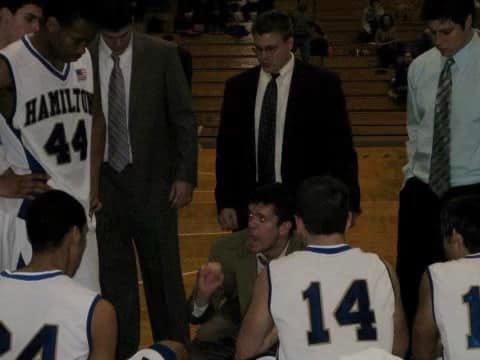In the wake of playing Tobin Anderson, I grew up.
As a player, I couldn't handle him. As I became a coach, I began to understand life.
If you know Coach Tobin Anderson, his FDU team’s win last night is no surprise.
The guy prepares his players for games with unimaginable detail. There is nothing casual or accidental about his practices. There is nothing nonchalant about his speeches. He is a legendary ball-handling instructor, a phenomenal coach of defensive principles, a nocturnal preparer for games, an excellent decision maker, able to remove emotion in the heat of the moment.
He deserves to have his feet on this stage. He deserves a recliner there, in fact.
I spent my senior year at Hamilton College unable to appreciate the gift the basketball gods gave me. Coach Anderson had just replaced the legendary Tom Murphy. I was the lone senior, still in love with Murph. I held endless anger over the college’s mishandling of his departure, after 600 wins and countless other escalades.
We went 18-10, losing in the finals of our conference tournament, which we had won the previous two years in a row. Apparently, I was ahead of our culture’s time; I blamed the coach, and not my terrible attitude.
The truth was, my cranial-rectal inversion was at fault, not Coach.
I moved to Belfast, where I played and coached. Soon enough, my playing days ended and I became just another coach. As that process evolved, I saw the game differently. More so, I saw and felt what a coach’s role meant.
After two years living in Ireland, I either sent Coach Anderson a letter or asked him to meet. I sheepishly apologized for the way I had acted for an entire season. For the eye-rolls, the shrugged shoulders, the disbelief in his philosophy.
It shocked me then - but not now - when he said he was sorry, too. He said he knew what he had done wrong as a coach that year. He had looked back, analyzed not just the plays we ran or the defensive strategy, but the more delicate stuff. His approach to player relationships, his perspective on my situation.
“We were both in such a tough situation,” he said. “I think we both would have changed a lot about how we handled it.”
Coach Anderson showed me that being vulnerable as a leader is not just okay, but part of becoming great.
It humbled me instantly. It made me want to be a great coach, like him; it made me want to understand the game more and more. Above all, it made me realize how imperfect we are, that forgiveness exists, and that, in my case, we can’t let misdirected anger eat us alive.
“The bounces keep going for FDU,” said an announcer last night.
That’s his oversimplification.
Here’s mine: Purdue didn’t have Tobin Anderson.



